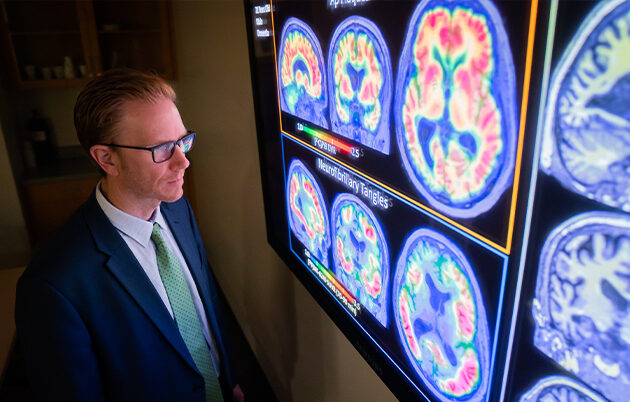“We showed [that] people with Alzheimer’s disease have more gut inflammation, and among people with Alzheimer’s, when we looked at brain imaging, those with higher gut inflammation had higher levels of amyloid plaque accumulation in their brains,” said Bendlin, who has a doctorate in psychology.
Calprotectin levels in this study and previous studies have been found to rise with older age. One theory is that gut inflammation is caused by changes in the microbiome that occur as people age and this inflammation can further contribute to neurodegenerative diseases.
However, Bendlin urged caution in interpreting the relationship between inflammation and Alzheimer’s, as additional research is needed to understand whether there is a cause-and-effect link.
“We can’t infer causality from this study; for that, we need to do animal studies,” she said.
Bendlin’s two collaborators and senior authors on this paper, Federico Rey, associate professor of bacteriology, UW–Madison, who holds a doctorate in microbiology, and Tyler Ulland, assistant professor of pathology and laboratory medicine, UW School of Medicine and Public Health, who holds a doctorate in cellular and molecular biology, are now performing animal studies to determine whether inflammation or diet changes can elicit a mouse version of Alzheimer’s. Three UW–Madison graduate students, Margo Heston, Kendra Hanslik and Katie Zarbock, were co-first authors on this study.
In an earlier study published in 2017, the research team found significant differences in the gut microbiome of people with Alzheimer’s dementia and those without it. The authors theorized that gut changes may contribute to systemic inflammation that disrupts the blood-brain barrier, which normally protects the brain from infection and toxins, according to Rey.
“Increased gut permeability could result in higher blood levels of inflammatory molecules and toxins derived from gut lumen, leading to systemic inflammation, which in turn may impair the blood-brain barrier and may promote neuroinflammation, and potentially neural injury and neurodegeneration,” he said.
Rey and Ulland’s labs plan to test these ideas in a mouse model of Alzheimer’s disease, altering gut permeability by making precise changes in the gut microbiome.


